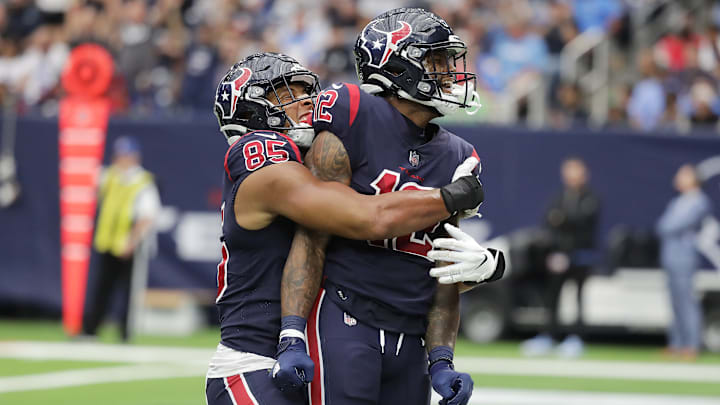
The upside of having a quarterback
It is no secret that Collins's former quarterback, Davis Mills, was not getting the job done. That's why the Texans selected Ohio State quarterback C.J. Stroud at number two overall in the NFL draft. Stroud showed throughout his collegiate career to be the most accurate passer in college. We did an extensive scouting report on the former Buckeye that breaks down three of Stroud's most telling games and you consistently see accurate throws to all levels of the field.
Collins has been plagued by some of the worst quarterback play in NFL history in his first two seasons. Per PFF, of the former Wolverine's 37 catches last year, 12 were heavily contested catches— a whopping 32.4%.
Further evidence of this can be seen by Collins's overall grade of 92.9 on intermediate catches, despite only catching nine out of 22 deep passes. Why were only 39% of the intermediate passes caught from a receiver with zero drops? The quality of the passes thrown was subpar. Davis Mills was graded as the worst starting quarterback on intermediate throws by PFF. The next worst was Zach Wilson.
The quarterback change will help Collins’s elite hands shine.
When we compare Davis Mills to C.J. Stroud, there is a vast difference in ability, and the numbers are eye-popping.
Watching CJ Stroud's tape at Ohio State, there's a consistent theme of laying the ball out to his wide receivers facing one-on-one coverage. Game after game, Stroud gave his receivers a chance to win in one-on-one scenarios. His elite precision typically led to easier contested catches. PFF has a stat called big-time throws, or BTT. A big-time throw is defined as a pass with excellent ball location and timing, generally thrown further down the field and/or into a tighter window.
CJ Stroud led the entire draft class with 29 big-time throws. Most notably, eight of them against the Georgia Bulldogs in the college football playoffs. His adjusted NFL passer rating by PFF was a whopping 125. I think Stroud is going to target Collins a whole lot more than Collins ever has been in one-on-one situations and give Collins the best chance to show off his elite contested catch ability. This could bear a ton of fruit in the red zone, where Collins was underutilized to a fault so far in his career.
